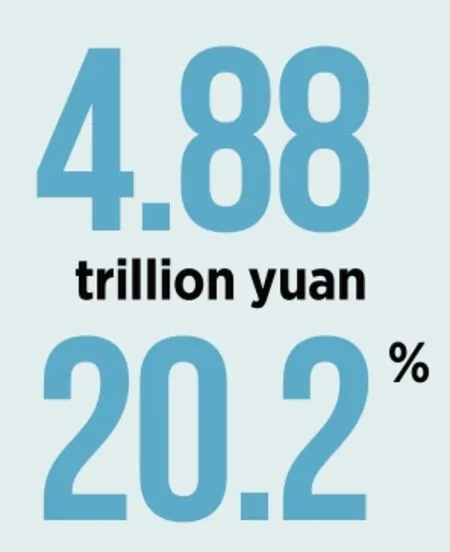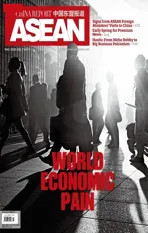TRADE ON TRACK
2022-06-22ByLanXinzhen
By Lan Xinzhen
T he Office of the United States Trade Representative announced on March 23 it would reinstate 352 of the 549 previously granted and extended product exclusions under the China Section 301 Investigation,covering electronic components,bike parts,electric machines and seafood products.
This decision on the part of the U.S.comes for the sake of its own interests,but will also benefit overall trade between both countries.China believes the American practice of imposing higher tariffs on Chinese exports is in neither party’s interests.With rising inflation and a sluggish global economic recovery,the U.S.should cancel all additional tariffs it previously slapped on Chinese exports to the U.S.and push bilateral trade relations back on track,for the fundamental good of all consumers and producers involved.
China considers the Sino-American relationship a win-win,not a zero-sum competition.It generally does not mean to retaliate,but the country was compelled to take countermeasures when the U.S.launched the trade war in 2018.Still,China has tried its utmost to minimize the harm inflicted on both economies.
Despite ever-warming bilateral economic cooperation and connections over the past five decades,the U.S.chose to wage a trade war to contain China.Yet following four years of ongoing conflict,the former seems to have realized that,when intertwined across the board,imposing higher tariffs on Chinese exports tends to backfire.
Total trade volume between the countries in 2021 hit 4.88 trillion yuan (US$768.6 billion),up 20.2 percent yearon-year.This reveals just how the conflict failed to slash bilateral trade,which remains robust thanks to strong market demand.
Adding tariffs on Chinese exports eventually sees the cost passed on to American consumers.According to the American Action Forum,the added tariffs on Chinese exports to the U.S.during the Donald Trump administration involved US$331.9 billion worth of goods,with added tariffcosts amounting to US$51.4 billion.Further calculations estimate 92.4 percent of the costs of the higher tariffs on Chinese exports were imposed on U.S.consumers.
U.S.inflation hit a fourdecade high in February,with the consumer price index rising by 7.9 percent year-onyear.Surging inflation is a result of assorted factors like relentless money printing and trade war-induced price hikes.Bearing this in mind,on December 2,2021,U.S.Treasury Secretary Janet Yellen admitted that adding tariffs on Chinese exports worth hundreds of billions of U.S.dollars had indeed raised consumer prices in the U.S.
Perching on the highend of the manufacturing industry,the U.S.heavily relies on countries like China and Mexico for light industrial products.Consequently,American consumers will suffer more from economic conflict.

Total trade volume between the countries in 2021 hit4.88 trillion yuan(US$768.6 billion),up20.2 percentyear-on-year.

The Office of the United States Trade Representative announced on March 23 it would reinstate352of the549previously granted and extended product exclusions under theChina Section 301 Investigation,covering electronic components,bike parts,electric machines and seafood products.
In his State of the Union Address on March 1,President Joe Biden announced that his primary mission was to curb inflation surges.But where should one start? The reinstatement of certain exclusions under the China Section 301 Investigation seems a good beginning,but its span remains too narrow.
Many Americans oppose the lingering trade war.Since Biden took office in January 2021,the U.S.government has received more than 53,000 requests for tariff concessions.But the limited exclusions prove that Sino-American relations are still mired in the quicksand created by the Trump administration.
On September 10,2021,the video call between President Xi Jinping and President Biden set the tone of“getting back on track,”and signaled that the China-U.S.trade relationship was about to improve.
Another video call between the two presidents on March 18 demonstrated the willingness on both sides to stabilize and improve bilateral relations.It’s safe to say a favorable political condition is now in place for both sides to cancel added tariffs and return trade relations to a normal state.This will in turn allow the U.S.to ease its domestic inflationary pressures.
